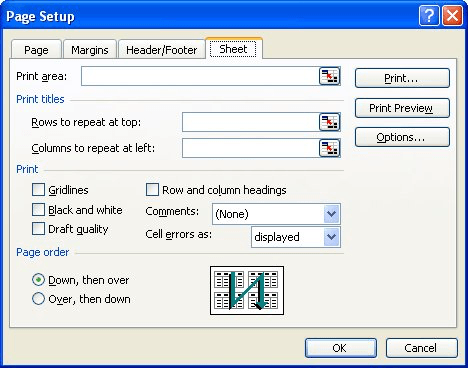Please Note: This article is written for users of the following Microsoft Excel versions: 2002 and 2003. If you are using a later version (Excel 2007 or later), this tip may not work for you. For a version of this tip written specifically for later versions of Excel, click here: Hiding Errors on Printouts.
Excel has a number of different errors that can appear in your worksheet, for any number of reasons. Errors values show up with a pound (hash) symbol followed by the type of error, as in #DIV/0! or #N/A.
When you print your worksheet, Excel prints the error values, by default. If you prefer, you can choose to have Excel not print the error values. Follow these steps:

Figure 1. The Sheet tab of the Page Setup dialog box.
In step 3, you have several options in the drop-down list:
ExcelTips is your source for cost-effective Microsoft Excel training. This tip (2989) applies to Microsoft Excel 2002 and 2003. You can find a version of this tip for the ribbon interface of Excel (Excel 2007 and later) here: Hiding Errors on Printouts.

Program Successfully in Excel! This guide will provide you with all the information you need to automate any task in Excel and save time and effort. Learn how to extend Excel's functionality with VBA to create solutions not possible with the standard features. Includes latest information for Excel 2024 and Microsoft 365. Check out Mastering Excel VBA Programming today!
Want to create a printed record of the properties associated with a workbook? There is no easy way to do it in Excel. ...
Discover MoreIf your worksheet, when printed, requires more than a single page to print, you may want to only print a range of the ...
Discover MoreIf you want to automatically print a particular area of your worksheet at a specific time of day, you'll love this tip. ...
Discover MoreFREE SERVICE: Get tips like this every week in ExcelTips, a free productivity newsletter. Enter your address and click "Subscribe."
There are currently no comments for this tip. (Be the first to leave your comment—just use the simple form above!)
Got a version of Excel that uses the menu interface (Excel 97, Excel 2000, Excel 2002, or Excel 2003)? This site is for you! If you use a later version of Excel, visit our ExcelTips site focusing on the ribbon interface.
FREE SERVICE: Get tips like this every week in ExcelTips, a free productivity newsletter. Enter your address and click "Subscribe."
Copyright © 2026 Sharon Parq Associates, Inc.
Comments